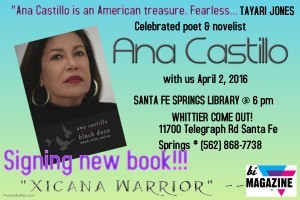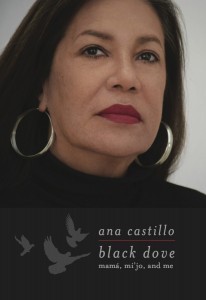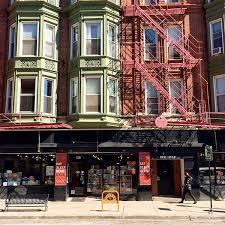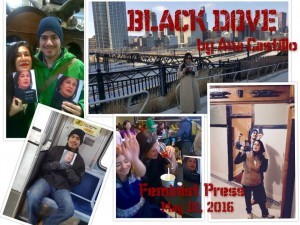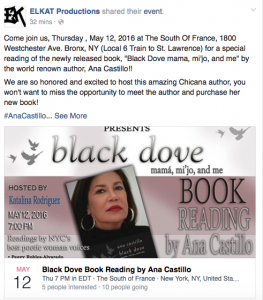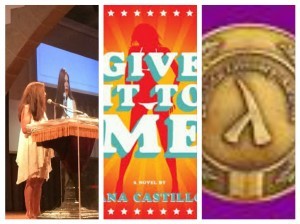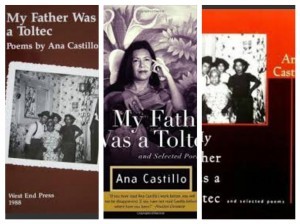Ana Castillo's Blog, page 13
April 2, 2016
6 PM TODAY. WHITTIER READING & SIGNING PRE-SALE: BLACK DOVE.
March 17, 2016
Word Up Books NYC May 11th
Word Up Books Press Release:
Ana Castillo is one of the most powerful voices in Chicana literature. Her award-winning novels, plays, poetry and essays offer sharp, incisive, and passionate socio-political commentary on issues of race, gender, motherhood, and identity. She’ll read, discuss, and sign copies of her provocative new memoir, BLACK DOVE: Mamá, Mi’jo, and Me, which weaves intergenerational stories of her Mexican-American family and looks at what it means to be a single, brown, feminist parent in a world of mass incarceration, racial profiling, and police brutality.
Ana Castillo constituye una de las voces más potentes de la literatura chicana. Sus premiadas obras de narrativa, teatro, poesía y ensayo ofrecen reflexiones sociopolíticas agudas, incisivas y apasionadas sobre temas como la raza, el género, la maternidad o la identidad.La escritora leerá, comentará y firmará copias de sus nuevas y provocativas memorias: Black Dove: mamá, mi’jo and me [Paloma negra: mamá, mi’jo y yo], donde entreteje relatos intergeneracionales de su familia mexicano-americana, al tiempo que explora el significado de lo que supone ser soltera, de piel morena, feminista y madre en un mundo de encarcelaciones masivas, elaboración de perfiles a partir de estereotipos raciales y brutalidad policial.
Reading with Nancy Mercado.
Discussing & signing from new release, Black Dove.
March 12, 2016
March 8, 2016
ALBUQUERQUE BOOK WORKS
March 4, 2016
UNABRIDGED BOOKS May 22 Chicago
February 27, 2016
NEW YORK May 12th free to the public.
February 24, 2016
BLACK DOVE (Paloma Negra) Press Release
One of the most powerful voices in contemporary Chicana literature on what it means to be a Mexican-American woman, feminist, and single mother in a world that often doesn’t feel like home
Black Dove
Mamá, Mi’jo, and Me
Ana Castillo
“Reading Black Dove is like sitting down to an intimate chat with Castillo about growing up with one foot in your parents’ world and the other in your own. Thank you for this gift.”
— Veronica I. Arreola, founder of Viva La Feminista
“Órale! Castillo teaches us how to become the Latina sister outsider we all dream of being.”
—Ileana Jiménez, founder of Feminist Teacher
“Ana Castillo is an American treasure. Fearless, compassionate, and flat-out brilliant—she is the writer we need as we navigate the challenges of our ever-changing world.”
—Tayari Jones, author of Silver Sparrow
“Ana Castillo is a warrior. She is a warrior with a brilliant mind and a wickedly witty tongue. Her take-no-prisoners view of the Chicano experience plumbs the range of Mexican and Mexican-American history, from pre-conquest to modern day. With all the skill imprinted by her Mayan ancestors, she weaves reality, the supernatural, spirituality, dualism, sexuality, sexism and classism into the warp and weft of her works. She has taken on her Chicana heritage, both defying it and defining it.”
—Bi Magazine
“Castillo describes a childhood and young adulthood spent moving among Mexico, Chicago, and elsewhere, pursuing education, love, and a growing sense that writing could provide a way to make sense of her life and the difficulties faced by a nation with many cultures living side by side. It is a high-wire act, to bring together a combination of personality characteristics and specific cultural touchstones and make it resonate with a wider readership, but the author handles it well… a compassionate look at those crossing points in our shared lives.”
—Kirkus Reviews
“Paloma Negra,” Ana Castillo’s mother sings the day her daughter leaves home, “I don’t know if I should curse you or pray for you.”
Growing up the daughter of a Mexican Indian mother (born in Nebraska, sent back to Mexico in 1929 with repatriations, who then made her way back to the U.S.) and Mexican-American father during the 1970s, Castillo defied convention as a writer and a feminist. A generation later, her mother’s crooning mariachi lyrics resonate once again. Castillo—now an established Chicana novelist, playwright, and scholar—witnesses her own son’s spiraling adulthood and eventual incarceration. Standing in the stifling courtroom, Castillo describes a scene that could be any mother’s worst nightmare. But in a country of glaring and stacked statistics, it is a heart-wrenching, soul-crushing experience especially reserved for mothers like her: the inner-city mothers, the single mothers, the mothers of brown sons.
With fierce intelligence, raw honesty, startling humor, and love, Castillo weaves intergenerational stories traveling from Mexico City to Chicago. She writes of her family’s history in Mexico and America, their lives of hard-work and poverty, and examines her feelings of isolation, loneliness, and otherness. She opens up, for the first time, about the love of her life, a woman who left her heart-broken, and writes about the men in her life who often disappointed her. She writes of the tenderness she feels for her son and her search for spiritual and personal fulfillment. And, in doing so, she narrates some of America’s most heated political debates and urgent social injustices through the oft-neglected lens of motherhood and family.
BLACK DOVE: Mama, Mi’jo, and Me
By Ana Castillo
$16.95 / 350 pages
The Feminist Press at CUNY (May 10, 2016)
ISBN-10: 1558619232
ISBN-13: 978-1558619234
www.anacastillo.com
ABOUT ANA CASTILLO
Ana Castillo, born in Chicago on June 15, 1953, is a celebrated and distinguished poet, novelist, short story writer, essayist, editor, playwright, translator and independent scholar.
Her novel, Sapogonia, was a New York Times Notable Book of the Year and her first work of fiction, The Mixquiahuala Letters, received an American Book Award from the Before Columbus Foundation. Other award-winning and bestselling novels include Give It to Me which was the 2014 winner of the Best Bisexual Fiction from the LAMBDA FOUNDATION, So Far From God, The Guardians and Peel My Love like an Onion. Massacre of the Dreamers, her classic, award-winning collection of essays celebrated its 20th anniversary with an updated edition released in 2014 and her award winning novel in verse, Watercolor Women, Opaque Men will be re-released in fall 2016 by Northwestern University Press in a new edition.
Called “the most daring and experimental of Latino novelists,” Commonweal contributor Ilan Stavans noted that Castillo’s “desire to find creative alternatives and to take risks is admirable.” Her work in poetry and prose is at once highly innovative and based on established oral and literary traditions.
Castillo is editor of La Tolteca, an arts and literary ‘zine dedicated to the advancement of a world without borders and censorship and sits on the advisory board of the new American Writers Museum in D.C.
She received an M.A from the University of Chicago and a Ph.D. from University of Bremen, Germany in American Studies. She has also received an honorary doctorate from Colby College.
She was the first Sor Juana Inés de la Cruz Endowed Chair at DePaul University, held The Martin Luther King, Jr Distinguished Visiting Scholar post at M.I.T. and was the Poet-in-Residence at Westminster College. In 2013 she was the recipient of the American Studies Association Gloria Anzaldúa Prize, given to an independent scholar. Dr. Castillo held the Lund-Gil Endowed Chair at Dominican University (IL) in 2014-15.
In June 2015, Ana Castillo was given the Lifetime Achievement Award in literature for her “literary contributions to the Latino/a community, and commitment to the betterment of our younger generations” by Latina 50 Plus, a motivational organization based in the Bronx, NY.
Other awards include a Carl Sandburg Award, a Mountains and Plains Booksellers Award, and fellowships from the National Endowment for the Arts in fiction and poetry. She was also awarded a 1998 Sor Juana Achievement Award by the Mexican Fine Arts Center Museum in Chicago.
Castillo’s So Far From God and Loverboys are two titles on the banned book list issued by the TUSD in Arizona.
She has been profiled and interviewed on National Public Radio and the History Channel and was a radio-essayist with NPR in Chicago.
Dr. Castillo joined the Bread Loaf faculty with Middlebury College in Santa Fe, teaching creative non-fiction, and the American Indian Institute of the Arts, Santa Fe, NM summer MFA programs.
BIBLIOGRAPHY
POETRY
o Zero Makes Me Hungry, Scott, Foresman (Chicago), 1975.
o i close my eyes (to see), Washington State University Press (Pullman, WA), 1976.
o Otro canto, Alternativa Publications (Chicago, IL), 1977.
o The Invitation, privately printed, 1979, revised edition, La Raza (San Francisco, CA), 1986.
o Women Are Not Roses, Arte Público (Houston, TX), 1984.
o My Father Was a Toltec: Poems, West End Press (Albuquerque, NM), 1988, published as My Father Was a Toltec and Selected Poems 1973-1988, Norton (New York, NY), 1995.
o I Ask the Impossible, Random House (New York, NY), 2001.
o Watercolor Women/Opaque Men: A Novel in Verse, Curbstone Books (Evanston, IL), 2005.
FICTION
o The Mixquiahuala Letters (novel), Bilingual Press (Binghamton, NY), 1986.
o Sapogonia: An Anti-Romance in 3/8 Meter (novel), Bilingual Press (Tempe, AZ), 1990.
o So Far from God (novel), Norton (New York, NY), 1993.
o Loverboys (stories), W. W. Norton (New York, NY), 1996.
o Peel My Love Like an Onion (novel), Bantam Doubleday Dell (New York, NY), 1999.
o The Guardians, Random House, 2008.
o Give It To Me, The Feminist Press (New York, NY), 2014.
ESSAYS
o Massacre of the Dreamers: Essays on Xicanisma, University of New Mexico Press (Albuquerque, NM), 1994, revised and reissued 2014.
o My Mother’s Mexico: New and Collected Essays, The Feminist Press, 2015.
PLAYS
o Clark Street Counts (play), produced 1983.
o Psst…: I Have Something to Tell You, Mi Amor: Two Plays, Wings Press (San Antonio, TX), 2005.
TRANSLATIONS
o Victoria Miranda and Camilo Fanion, On the Edge of a Countryless Weariness/Al filo de un cansancio apatricia,ISM Press (San Francisco, CA), 1986.
EDITOR
o (Editor, with Cherie Moraga) This Bridge Called My Back, ISM Press (San Francisco, CA), 1988, Spanish translation by Castillo and Norma Alarcon published as Este puente, mi espalda: Voces de mujeres tercermundistas en los Estados Unidos, 1988.
o (Editor, with Norma Alarcon and Cherie Moraga) The Sexuality of Latinas, Third Woman Press (Berkeley, CA), 1993.
o (Editor, with Heiner Bus) Recent Chicago Poetry, University of Bamberg (Bamberg, Germany), 1994.
o (Editor) Goddess of the Americas: Writings on the Virgin of Guadalupe, W. W. Norton (New York, NY), 1996.
FOR CHILDREN
o My Daughter, My Son, the Eagle, the Dove, Dutton Children’s Books (New York, NY), 2000.
Contributor to anthologies, including The Third Woman: Minority Woman Writers of the United States, Houghton Mifflin, 1980; Cuentos Chicanos, University of New Mexico Press, 1984; Nosotras: Latina Literature Today, Bilingual Press,1986; English con Salsa, Macmillan, 1994; More Light: Father and Daughter Poems, Harcourt, Brace, 1994; Daughter of the Fifth Sun, Riverhead Books, 1995; Latinas, Simon & Schuster,1995; and Tasting Life Twice, Avon, 1995. Contributor to periodicals, including Essence, Frontiers, Letras Femininas, Los Angeles Times, Maize, Nation, Prairie Schooner, Revista Chicano-Riqueña, River Styx, San Francisco Chronicle, Spoon River Quarterly, and Washington Post.
Castillo’s papers are housed at the University of California, Santa Barbara.
ANA CASTILLO, XICANA WARRIOR
BY KATE RUSSELLPEOPLE
When something bad happens to you, you are a victim. If you fight to overcome it you are a survivor. If you then make it your cause to fight for others, you are a warrior.
Ana Castillo
Ana Castillo is a warrior. She is a warrior with a brilliant mind and a wickedly witty tongue. Her take-no-prisoners view of the Chicano experience plumbs the range of Mexican and Mexican-American history, from pre-conquest to modern day. With all the skill imprinted by her Mayan ancestors, she weaves reality, the supernatural, spirituality, dualism, sexuality, sexism and classism into the warp and weft of her works. She has taken on her Chicana heritage, both defying it and defining it.
In her poetry, essays, novels, and plays, she examines the Chicano world view through the lens of what she calls Xicanism, especially the Xicanisma of Chicano women. As she describes it, “Xicanisma is an ever present consciousness of our interdependence specifically rooted in our culture and history. Although Xicanisma is a way to understand ourselves in the world, it may also help others who are not necessarily of Mexican background and/or women. It is yielding; never resistant to change, one based on wholeness not dualisms. Men are not our opposites, our opponents, our ‘other’.”
Her novels snap with gritty wit and wisdom as she illustrates the complexities of being Xicanisma. It overlays everything: family, careers, relationships, sexuality. She says she likes to look between the absolutes, between the black-and-white, either/or, and burrow into the gray areas. In that gray, she finds truths that transcend ethnicity, religion or sexuality and speak to the core of us all.
In Castillo’s recent novel, Give It To Me, forty-something fashionista Palma Piedras chews through affairs with her ex-con cousin and a butch lesbian in her search for the meaning of life. Abandoned by her parents and raised with her cousin in her grandmother’s highly dysfunctional home, Palma is going through an epic mid-life crisis. “When she thought about the future it looked like the surface of Mars or a Wal-Mart parking lot. Hostile and non-trekable. Holy Cow. Her problem wasn’t being forty plus. She had become a Nihilist Mulch.” Many of us will recognize those WTF moments when we wonder how the hell we got here and where to go next.
Through it all, Palma remains a warrior, as does Castillo. Born and raised in Chicago’s Little Italy, she says she probably grew up more Chicagoan than Chicana. Her father’s family had lived in Chicago for nearly a hundred years, and her mother immigrated to Chicago from Mexico to find work. In her eyes, she was a born American. But to her neighbors, she was brown. She was “other,” with no real sense of what that otherness meant.
In college, she began to find her identity as Chicana. Growing up, she says her factory worker parents were not very sociable within the small Mexican community. “So it was a bit isolating. I had a lot of mixed feelings about my identity and my family, and as time went on, questioning a lot of things as a woman. I was a self-styled feminist,” Castillo recalls. Chicago in the 1960s sizzled with protests. The Democratic Convention, Martin Luther King’s visit there, “where he got the worst reception except for Memphis,” the Vietnam War and all the 60s activism shaped and marked her, she says.
While others advocated waging peace, Castillo went to war. Though she began writing as a child, she first wanted to be a fashion designer. Lacking the connections to get into the design schools she wanted, she studied first at Chicago City College before completing her BS in art at Northeastern Illinois University. In college, there were few women’s studies, much less Mexican-American studies. She set about to change that, becoming a lecturer to fund her Master’s and Doctorate degrees. She was delighted when her books began appearing in school curricula, and infuriated when her books, and all Mexican-American studies, were banned by the Tucson school district.
Though most of her works draw from her own experiences and feelings as a single Chicana mother, activist, and lover of men and women, she has not written her own story until now. With her son facing his own challenges as a brown man making his way in a white society, she has written Black Dove: Mamá, Mi’jo, and Me (Life Stories), due in May, 2016.
With her trademark humor, she writes about her son, and The Affair with the woman she loved. In the days when everything was black and white, gay or straight, here she was, in the gray. She was brown. She was bisexual. She was an outspoken Xicana activist who silenced herself to keep her son’s father from gaining custody.
Today, her son is grown. The One is ancient history. She is no longer silent. Indeed, she is a proud, in-your-face Xicana who said in a keynote address: “First her books get banned in Tucson, now she’s made a breakthrough in feminine spirituality. This is a dangerous woman!”
She is at home with her sexuality. In her 1979 poetry book, The Invitation, she wrote of bisexual desires, and the right to have any desires. It appeared then that no one was interested in the offer. So when Give It To Me was announced as the 2014 Lambda Literary Award winner for Bisexual Fiction, she says, “I was stunned.”
All the battles on her journey to that moment streaked through her mind. She took a breath.
“In 1979, I issued an invitation,” she told the audience. “Thank you, Lambda, for RSVPing.”
For more information on Ana Castillo, visit anacastillo.com
Chicana Novelist and Poet Ana Castillo Discusses Poetry, Fiction and the Xicanisma Experience
By Nicole Akoukou Thompson (staff@latinpost.com)
Jan 08, 2015
In this edition of Latin Post.com’s “Palabras series,” we speak to Chicana author Ana Castillo, who, in early adulthood, focused her attention on poetry for self-expression, and began to seek out other forms of writing as a way to contribute to social change and to address injustice. (Photo : Ana Castillo)
Xicanisma captures the millennia-long experiences of the Chicana feminist, since the time of La Malinche/Malintzin, a Nahua woman who stood beside conquistador Hernán Cortés and played a steering role in the Spanish conquest of the Aztec Empire, until now.
However, it was Chicana novelist, artist and poet Ana Castillo who coined the term “Xicanisma” during the 1980s; at a time when the lives of Chicanas were finally being formalized into writing. Sexism endured within the active Chicano movement created rifts within the ranks and Castillo recognized a need for an isolated term for Chicana feminists.
So, to depart for Chicanismo, Castillo chose to use an ‘X,’ and she used the newfangled term with great power in her brilliant work “Massacre of the Dreamers: Essays on Xicanisma,” a non-fiction publication that was developed out of a need to address a feminism that was focused on Mexican/Chicana/Mexican-American and Mexican indigenous women.
“The moment you give something a name, you acknowledge its existence, you empower it. Since, coining Xicanisma and ‘Massacre of the Dreamers,’ and a few others books in that era, Chicana feminism has been established in academia and in grassroots organizing,” Castillo said to Latin Post. “The literary contribution of the Chicanas of my generation have empowered the subsequent generations of U.S. Latinas with regards to pursuing their education. Also, because of the popularity of MFA programs, the proliferation of writers and poets includes Latinas and gay Latinos. I include gay (and transgender) here because such aspiring writers and academics have also benefited from Chicana feminist thought.”
Born in Chicago, Illinois, Castillo spent periods of her life in California and in New Mexico, where she used illustration and writing to tell her story — using whatever materials were available due to her humble upbringing. In early adulthood, she focused her attention on poetry for self-expression, and began to seek out other forms of writing as a way to contribute to social change and to address injustice. And it was in her mid-20s that she assumed her position as a feminist.
She published a book of poetry (“Otro Canto”) before she even finished graduate school, and continued on to write 14 books, including the novels “Watercolor Women/Opaque Men,” “The Guardians” and her latest work “Give It to Me.” Those three books and others are the exemplary byproducts of her inspirations: La Virgen de Guadalupe; lanopales (the plant, not the food); the legacy of the great pre-Columbian civilizations of Mexico; prayer and meditation; her adobe capilla in the desert; her mother and abuelita; the many of the people whom she’s slept with throughout her life (occasionally seasonally); churches and temples worldwide; animalitos; the desert and its skies; the infinity of the night; the Bible; frijoles; chiles and red lipstick.
“‘Watercolor Women/Opaque Men’ is a novel told in thiree-line free verse. It is an epic account of the life of a ‘nameless’ woman who is born in the labor camps of this country, works in the fields until she runs away and becomes an artist, mother and makes a living how she can. She is her own woman. The poems also address other women’s and men’s lives,” said Castillo. “‘The Guardians’ is a novel about an undocumented high school youth left with his aunt on this side of the border. His parents have both disappeared and he ends up going down the wrong path. The inspiration for the story comes from the environment where I have made my home for ten years, which is out in the desert in Southern New Mexico.
“[And] ‘Give It to Me’ is a novel that came out in 2014. I work hard at challenging myself, and the story was driven by comedic episodes. It’s about a woman who is unapologetically herself and owns her sexuality. Not everything is lighthearted in her life, quite often the contrary. Somehow she manages to get through it all to a very promising future,” Castillo concluded.
During Latin Post’s interview with Ana Castillo, she also discussed writing about one’s culture in a nation that doesn’t actively pursue that knowledge; the long time marginalization of Mexicans despite fundamental contributions; Chicana academics’ reliance on black feminism and the term ‘womanism’ (coined by Alice Walker); and her own work in the scoop of the Chicano legacy.
“I don’t think I am the one to respond to how my work has captured the importance of the Chicano legacy. Sometimes it’s categorized as such, along with other poets and artists of my generation. However, I have not stopped writing and publishing. And my works address current issues,” Castillo stated. “My newest novel, ‘Give It to Me,’ takes place during the recent recession and is about a ‘fashionista,’ a sexually uninhibited woman. Also, the 20th anniversary updated edition of my essays on ‘Xicanima’ address current issues. ‘The Guardians,’ a novel I produced a few years back, addressed the U.S./Border undocumented migrant crisis. My legacy, if I should speak to my work that way, is still being formed.”
In addition to the recent publication of “Give it to Me” and 20th anniversary release of “Massacre of The Dreamers: Essays on Xicanisma” through the University of New Mexico Press, Castillo continues leave her mark. She’s working on the completion of two non-fiction projects, “My Mother’s Mexico: New and Collected Essays” and a new book of poetry.
“There are always projects in the works,” the author remarked concisely. “No doubt, I’m old school. But, even so, I’ve come to my writing life on my own and on my own terms. Not having studied writing or literature formally, I remain free to follow my own instincts. Let’s see where they take me next.”
February 22, 2016
GIVE IT TO ME: LAMBDA Award winning novel (2014)
REVIEWS : FICTION : ARTICLE
‘Give It To Me’ by Ana Castillo
Review by July Westhale
- See more at: http://www.lambdaliterary.org/reviews...
A writer’s relationship with solitude is paradoxical. Alone time is necessary for completing work, yet if writing is done correctly, it can create a sense of global community that inspires solidarity. If done well, an otherwise insular experience relayed through a story can make the personal and intimate something universal and poignant, something that speaks to the human condition with authority and grace. I think here of the poetry of Nikki Finney, who wrote in her book of poems Head Off & Split about the experience of the devastation of Katrina as a working class Black woman in such a way that the book spoke across the disparity of sociopolitical differences.
It’s a gift when we find books like these. They are treasures where we can find our hardest experiences laid bare in front of us, as if to say, drink deeply and feel assured. Such is the case with Ana Castillo’s book Give It to Me. A gritty, yet humorous, book with unflinchingly honest characters, the novel follows protagonist Palma Piedras, a forty-three year old Latina divorcee who ignites an intensely deep sexual obsession with her cousin Pepito. Through the lens of Palma’s positionality (her upbringing with Pepito in their grandmother’s house, her failed marriage to an abusive man, her artistic aspirations, and her single, transient lifestyle complete with a cavalier house cat), the reader is invited into her world where everything, including the scenery, has a razor-sharp edge.
- See more at: http://www.lambdaliterary.org/reviews...
February 20, 2016
Early Poems
AMAZON SAID IT, NOT ME  :
:
Mixing the lyrical with the colloquial, the tender with the tough, Ana Castillo has a deserved reputation as one of the country’s most powerful and entrancing novelists, but she began her literary career as a poet of uncompromising commitment and passion. My Father Was a Toltec is the sassy and street-wise collection of poems that established and secured Castillo’s place in the popular canon. It is included here in its entirety along with the best of her early poems.
http://catdir.loc.gov/catdir/samples/...
Saturdays
c. 1968
Because she worked all week
away from home, gone from 5 to 5,
Saturdays she did the laundry,
pulled the wringer machine
to the kitchen sink, and hung
the clothes out on the line.
At night, we took it down and ironed.
Mine were his handkerchiefs and
boxer shorts. She did his work
pants (never worn on the street)
and shirts, pressed the collars
and cuffs, just so–
as he bathed,
donned the tailor-made silk suit
bought on her credit, had her
adjust the tie.
“How do I look?”
“Bien,” went on ironing.
That’s why he married her, a Mexican
woman, like his mother, not like
they were in Chicago, not like
the one he was going out to meet.
February 18, 2016
May 22nd UNABRIDGED BOOKS, CHICAGO signing BLACK DOVE
Turning a perceptive eye on her own life, Ana Castillo lyrically excavates her family’s surprising migration story, recalls her childhood as an intellectually spirited rebel, and recounts her against-all-odds journey to become a writer and activist. But when faced with the challenges of parenting, including her son’s sudden imprisonment, she must examine her identity as single, brown, and feminist—in a world of mother blaming, racial profiling, and anti-immigration rhetoric.
In these smart, poignant essays, Castillo confronts some of America’s most urgent social injustices through the idiosyncratic lens of motherhood and family history. Black Dove is a testament to the necessity, and the power, of becoming the narrator of one’s own life.
“Reading Black Dove is like sitting down to an intimate chat with Castillo about growing up with one foot in your parents’ world and the other in your own. Thank you for this gift.”—Veronica I. Arreola, founder of Viva La Feminista
“Órale! Castillo teaches us how to become the Latina sister outsider we all dream of being.”—Ileana Jiménez, founder of Feminist Teacher
“Ana Castillo is an American treasure. Fearless, compassionate, and flat-out brilliant—she is the writer we need as we navigate the challenges of our ever-changing world.”—Tayari Jones, author of Silver Sparrow
Ana Castillo is the author of several books of fiction, poetry, and nonfiction, including Massacre of the Dreamers, So Far from God, and the Lambda Award–winning Give It to Me.
Ana Castillo's Blog
- Ana Castillo's profile
- 337 followers


